- Home
- Janice Kay Johnson
Anything for Her
Anything for Her Read online
How far will he go?
For a solitary guy, Nolan Radek is suddenly surrounded by people. First there’s his teenage foster son. Then there’s Allie Wright—a stunning woman he instantly connects with. It’s out of character and Nolan can’t explain it, but from the moment they meet, he knows she’s for him.
Then he becomes aware she’s hiding something. And the more he pushes her to tell him, the further she retreats. He values honesty above all else, so what’s he to do? The truth, when it finally comes out, is nothing he expected. Worse, it triggers a cascade of life-altering events, and Nolan stands to lose Allie. And he must decide exactly what he’ll sacrifice to be with her.
“You’re beautiful.”
Nolan had to clear his throat. Yeah, way to blurt it out. “I don’t know if I’ve said that, but you are.”
“I’m not sure this—” Allie wagged her fingers, presumably encompassing the two of them “—is such a good idea. I mean, I like you, Nolan, but Sean surely needs to be your priority right now.”
“A parent doesn’t decide never to date again, because it upsets his kid. Especially since, in the long run—” Whoa. In the long run? He wasn’t thinking long run. Not yet. Or at least—he hadn’t known he was. “I want to keep seeing you, Allie.”
Her expression was startlingly vulnerable when she looked at him. “It’s been an awfully long time since I had any kind of serious relationship.”
“It has been for me, too.” He scrubbed a hand over his chin. Decided to confess more. “I’ve always been a loner. You’ve made me…not want to be.”
Dear Reader,
Every story I’ve ever read involving the Witness Security Program seemed to have a suspense plot. Interesting, but me, I always get thinking about the psychology of any unusual situation. I found the whole idea of giving up your identity and taking a completely new on—knowing that likely it would be forever—to be intriguing and yet disturbing. What would it be like to lose even your name? Have to give up a career and even hobbies that are distinctive enough to identify you?
For some reason, I kept thinking about the children most of all. The adults, at least, know what’s happened and why. They have good reason to be traumatized, sure, but they are complete personalities, at least. But what about those children? Worse yet, what if they’re pre-teens, or even teenagers, already confused, struggling for an identity?
I’m not always sure why I’m drawn to some ideas, some dilemmas, some problems, while others don’t resonate for me at all. I suspect the fact that my family moved a lot when I was young has something to do with why this idea caught fire right away for me. By the time I was nine years old, I’d lived five different places, one of which was a small village outside Mexico City. Moves are always scary for kids. Strangely, the move that truly terrified me never happened.
I was seven or eight years old when my dad was offered a position as the head of the Peace Corps volunteers in the Dominican Republic. I was petrified. I have a vivid memory of lying in bed in the dark, rigid with terror. In the end, Dad turned down the job, and our subsequent move to California instead was a huge relief.
I can only guess that, for this story, I was drawing on that huge well of fear I still remember. Add a dash of the bewilderment any kid being forced to move feels...and then ask the kid to give up her name and lie for the rest of her life about who she was and is. What a recipe for growing a troubled human being! One who desperately needs to feel she belongs.
Hope you love Allie and Nolan’s story as much as I did when writing it! I like to hear from readers, so contact me c/o Harlequin, 225 Duncan Mill Road, Don Mills, ON M3B 3K9, Canada.
Happy reading!
Janice Kay Johnson
Anything for Her
Janice Kay Johnson
ABOUT THE AUTHOR
The author of more than sixty books for children and adults, Janice Kay Johnson is especially well-known for her Harlequin Superromance novels about love and family—about the way generations connect and the power our earliest experiences have on us throughout life. Her 2007 novel Snowbound won a RITA® Award from Romance Writers of America for Best Contemporary Series Romance. A former librarian, Janice raised two daughters in a small rural town north of Seattle, Washington. She loves to read and is an active volunteer and board member for Purrfect Pals, a no-kill cat shelter.
Books by Janice Kay Johnson
HARLEQUIN SUPERROMANCE
1454—SNOWBOUND
1489—THE MAN BEHIND THE COP
1558—SOMEONE LIKE HER
1602—A MOTHER’S SECRET
1620—MATCH MADE IN COURT
1644—CHARLOTTE’S HOMECOMING*
1650—THROUGH THE SHERIFF’S EYES*
1674—THE BABY AGENDA
1692—BONE DEEP
1710—FINDING HER DAD
1736—ALL THAT REMAINS
1758—BETWEEN LOVE AND DUTY**
1764—FROM FATHER TO SON**
1770—THE CALL OF BRAVERY**
1796—MAKING HER WAY HOME
1807—NO MATTER WHAT
1825—A HOMETOWN BOY
SIGNATURE SELECT SAGA
DEAD WRONG
*The Russell Twins
**A Brother’s Word
Other titles by this author available in ebook format.
Contents
Chapter One
Chapter Two
Chapter Three
Chapter Four
Chapter Five
Chapter Six
Chapter Seven
Chapter Eight
Chapter Nine
Chapter Ten
Chapter Eleven
Chapter Twelve
Chapter Thirteen
Chapter Fourteen
Chapter Fifteen
Chapter Sixteen
Chapter Seventeen
Excerpt
CHAPTER ONE
TOUCH DELICATE, Nolan Radek slid his hands over the broad slab of granite. He’d once been told he had the gift of “stone hands,” a description he’d liked. He closed his eyes, the better to feel instead of relying on sight. Silky smooth...no. The pads of his fingertips found a hint of roughness there.
Opening his eyes, he studied it, turned the sander back on and eased it over the spot, then tested again. Better. He stroked the entire slab, which would be a garden bench, and was pleased with the vinelike effect of the darker veins within a pale green base. Occasional splashes of rusty-red might be the flowers.
The client had asked for a bench that would appear part of the landscape, having the solidity of stone and yet surprising the eye when it picked the bench out from the surrounding greenery.
A diamond polishing pad added more gloss—not too much. Neither garden bench nor sculpture should have the mirror shine of a kitchen countertop, but it should be lustrous to the touch. Instinct and long practice told him when to stop.
The two massive chunks that would form the support had been left rough-hewn but for a few asymmetrical streaks of smoothed granite that highlighted texture and grain. He intended to polish only the part of the back that would come in contact with the human body. Contrasts in texture were part of nature.
Tempted to start work on that slab, Nolan reluctantly decided to wait until morning. He had a kid now, and it was time he put on dinner.
Besides, he was a little surprised that Sean hadn’t come out to the workshop since he got home from school. He was usually eager to help. Nolan supposed it wasn’t uncommon for foster kids to work hard to please in hopes they’d be allowed to stay.
Having removed his ear protection, Nolan ran his fingers through his hair and shook his head like a dog springing from the pond. Granite dust flew. He shed his coveralls, hanging them beside the back
door, and used the utility sink to sluice off his hands and face. He checked to make sure everything was unplugged, turned off all the lights, then locked up and strode the short distance across the backyard to the farmhouse he called home.
After letting himself in the kitchen door, Nolan listened to the silence. Not that long ago, he’d been content to work alone all day, then go home to an empty house at night. No longer. But instead of calling for Sean, he went upstairs, lightly knocked on the bedroom door then pushed it open.
The boy was kneeling in front of his dresser. In a flurry of movement that seemed to hold alarm, he tried to poke something in the bottom drawer and shove it closed. His cheeks flushed.
“That your grandmother’s quilt top?” Nolan asked. He was careful to sound neutral, to pretend not to notice that Sean was embarrassed to be caught looking at it. Or had he been holding it, like a toddler with his blankie?
“Great-great-grandmother,” he mumbled.
“Right.” Nolan sat at the foot of the twin bed. “Do you mind if I take a look at it?”
He knew that it was damn near all this boy had in the way of a legacy from his family. From the sound of it, the only person who’d ever cared at all about Sean was the grandmother who’d taken him in when he was seven or eight, after his dad died.
He didn’t so much as remember his mother, didn’t even have a picture of her. Apparently she’d flitted off with some other man not long after her little boy took his first step.
The way Nolan had heard it, even though Sean’s grandma had been too old to raise an active boy, she had never considered consigning him to foster care. In death, she hadn’t had any choice. Unfortunately, his first foster placement had been a disaster. Nolan knew trust was going to be slow in coming.
The boy shrugged with exaggerated indifference. “Sure. I guess.” He pulled the drawer open again and took out the bundle of fabric, holding it up to Nolan, who checked to be sure he really had gotten his hands clean, then shook the quilt top out over the twin bed.
Like most men, he didn’t know much about quilts. But for some reason he knew he’d recognize a design called Log Cabin. He guessed it was a pretty common one, once upon a time. A woman could use just about any leftover fabrics she had around and still create something nice to look at.
His mother had kept an old family quilt rolled in a pillowcase in a cedar chest, which he thought was a waste. She claimed to want to preserve it. She’d called it Grandmother’s Flower Garden, he recalled. Tiny scraps of pastel fabric had been hand-pieced to make flowerlike circles. Nolan was glad Sean’s wasn’t that feminine looking. He had something precious to hold on to, and he could put it on his bed without embarrassment.
This quilt top was more geometric than anything, and had only two colors: a navy blue fabric polka-dotted with white, and plain white. Chains of small white squares linked bigger squares, all against the darker background. He couldn’t tell what it was meant to depict, if anything.
“I wonder why it never got finished,” he said.
“Grandma said supposedly it was the last one her grandma made before her arthritis got real bad.” There was a rhythm to the way Sean reported this bit of family wisdom; Nolan could tell that he was repeating what he’d heard, with the emphasis on the same words.
Nolan nodded, fingering the fabric. “I wonder if we could find someone to put it together. So you could use it on your bed.” He thought a boy who’d lost his family might sleep better warmed by a quilt his great-great-grandmother had made with love and handed down to her descendants.
Naked hope showed on Sean’s thin face. “Do you think there’s someone who would?”
“I don’t know,” he admitted, “but I can find out. I’ve seen a quilt shop in town that I think mostly sells fabric. I can stop by tomorrow and ask.”
“That’d be cool.”
Nolan ruffled the boy’s wheat-blond hair. “For now, why don’t you put it away. I’ll start dinner.”
“Are we having spaghetti?”
“I thought just hamburgers, if that’s okay. Maybe baked beans and corn.”
“Sure. You make good spaghetti, though.”
Nolan laughed at the broad hint. “I’ll make it later in the week, when I leave myself a little more time.”
Sean was carefully folding the quilt top when Nolan left to go back downstairs. As he located a can of baked beans in the back of the cupboard and took out pans, Nolan worried about what might have happened to make his foster son come home from school looking for comfort. Fourteen years old, a freshman in high school, he didn’t seem to have friends. He was a good-looking kid; there wasn’t anything obvious about him to draw scorn from his classmates. Living with his grandmother, he’d been in a different school district, but he’d been here for second semester last year, so he already knew some of the kids. Maybe everyone knew he lived in a foster home. Would he be looked down on?
Despite the amount of food he put away, so far Sean stayed skinny, but Nolan seemed to remember that being normal for teenage boys. Sean’s feet and hands were too big for the rest of him. But, damn, there’d been a time when Nolan had hardly been able to walk without tripping over his own feet, so he kind of guessed that was normal, too.
Sean had looked pretty raggedy when he first came to Nolan, and he’d admitted his clothes had mostly been acquired from thrift stores and even, a few times, from the charity that gave clothes to the really poor kids at school. That might make a teenager feel funny, wondering if someone would recognize the shirt he was wearing as their discard.
Give it time, Nolan decided. You’re fretting like an old lady. He’d only had the boy for a couple of months, and somehow he thought he should have been able to make everything right immediately. Snap, snap.
Faintly amused at himself, he put water on to boil and started husking the corn. Chances were good Sean had better social skills than he had. The kid would manage.
Feet thundered on the stairs, an encouraging sound. Sean burst into the kitchen. “I’m hungry! It’s cool you buy real hamburger buns. Grandma and me always just used bread. And it gets, like, soggy.”
Nolan grinned. “Glad you’re happy. Homework?”
“Yeah.” Sudden gloom. “It sucks.”
That all sounded normal to him, as well.
The water was boiling, so he dropped in four ears of corn then flipped the burgers. Damn, but he was hungry, too.
* * *
THE BELL HANGING from the door rang. In the middle of gathering tiny stitches onto her needle, Allie didn’t immediately look up. Her quilt frame was at the back of the shop, next to the large space where she taught classes, but allowed her a sight line to the front door. Some days she never had a chance to sit down or even reach for the needle, and most days there were bursts of several busy hours. But she almost always had a quilt assembled on the frame, with which she could contentedly fill the slow periods. The quilts she created herself inspired her customers, and she got excellent prices when she sold the finished work.
“I’ll be right with you,” she called.
Her customers were all women. Occasionally a husband would trail his wife in and hover, some patiently, some not so much, while she made her selections. Usually at this point many of the women would respond to Allie with something like, “That’s okay, I need to browse for a while anyway.” This time, there was no answer. Surprised, Allie finally lifted her head.
A man was making his way gingerly toward her, between the rows of bolts of fabric. For a moment she did nothing but gape at him. He didn’t belong, even more so than most men. She couldn’t decide why. He was good-sized, but not huge—maybe six feet or a little under, broad-shouldered and powerfully built, though not massive. Maybe what she was reading was his discomfort with being here.
He had brown, unruly hair and a plain, bony but nice face. Blunt cheekbones, a nose distinguished by a bump that suggested a long-ago break and eyes so blue Allie blinked in surprise.
She could almost sense h
is relief when he escaped the narrow aisles between tightly packed bolts of cotton into the clearing at the back.
She anchored the needle in the fabric. “Can I help you?”
“I hope so.” He stopped at the edge of the polished wood frame and gazed at the half-finished quilt with interest. “Well, isn’t that a beauty,” he murmured after a minute.
“Thank you. It’s a simple pattern called Lady of the Lake.”
“It’s the colors.” He seemed to be enthralled. “And the sewing you’re doing.”
“Quilting,” she corrected him. “This is what makes the sandwich of fabrics a quilt and not a comforter.”
She was happy with this particular quilt herself. She’d used all shades of purple, from palest lavender to deep, rich plum, interspersed with a red startling enough to define the blocks.
The man lifted a big, blunt-fingered hand and said, “Would you mind if I touched it?”
“Not at all. Come around here.” Part of the quilt was outside the frame.
He fingered it, seeming to savor the texture. He still held the corner of the quilt when he lifted his eyes, suddenly, to her face. They were not only vividly blue, they were penetrating. Allie had the uneasy feeling he was seeing more in her than most people did.
“Beautiful,” he said again, his voice deep and even a little gravelly, as if he ought to clear his throat.
Feeling her cheeks heat, Allie wondered if he was still talking about the quilt.
Get a grip.
“Can I help you?” she asked.
“I’m looking for someone willing to do what you’re doing right now. We have this part—” he touched the top “—but the thing never got finished. I guess I figured these days the sewing—the quilting,” he corrected himself, “was done on a machine.”
“Machine-quilting is more common than hand-quilting like I do,” she agreed. “And most often, what hand-done quilts you see were made in China or somewhere else with cheap labor, and usually the stitches are big and fairly sloppy.”

 Home Deadly Home
Home Deadly Home From Father to Son
From Father to Son All the Lost Little Horses (A Desperation Creek Novel Book 2)
All the Lost Little Horses (A Desperation Creek Novel Book 2) Hide the Child
Hide the Child Within Range
Within Range Between Love and Duty
Between Love and Duty First Comes Baby
First Comes Baby Charlotte's Homecoming
Charlotte's Homecoming In A Heartbeat (HQR Superromance)
In A Heartbeat (HQR Superromance)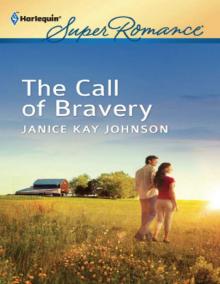 The Call of Bravery
The Call of Bravery In Hope's Shadow
In Hope's Shadow Anything for Her
Anything for Her Harlequin Superromance September 2014 - Bundle 1 of 2: This Good ManPromises Under the Peach TreeHusband by Choice
Harlequin Superromance September 2014 - Bundle 1 of 2: This Good ManPromises Under the Peach TreeHusband by Choice The Baby Agenda
The Baby Agenda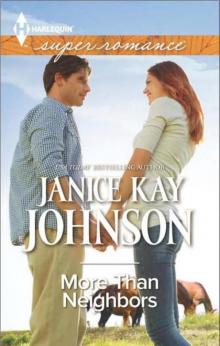 More Than Neighbors
More Than Neighbors Her Amish Protectors
Her Amish Protectors All That Remains
All That Remains Whisper of Revenge (A Cape Trouble Novel Book 4)
Whisper of Revenge (A Cape Trouble Novel Book 4) In a Heartbeat
In a Heartbeat A Mother's Claim
A Mother's Claim Because of a Girl
Because of a Girl Back Against the Wall
Back Against the Wall Dangerous Waters
Dangerous Waters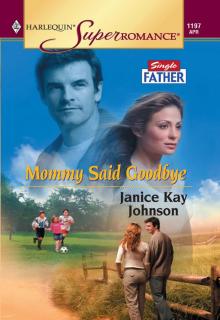 Mommy Said Goodbye
Mommy Said Goodbye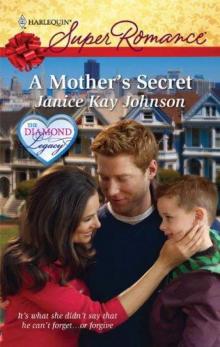 A Mother's Secret
A Mother's Secret See How She Runs (A Cape Trouble Novel Book 2)
See How She Runs (A Cape Trouble Novel Book 2) Plain Refuge
Plain Refuge Bringing Maddie Home
Bringing Maddie Home For the Girls' Sake
For the Girls' Sake Through the Sheriff's Eyes
Through the Sheriff's Eyes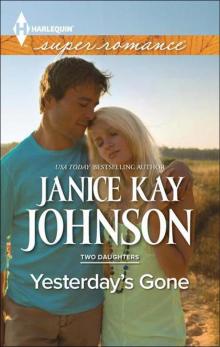 Yesterday's Gone (Two Daughters Book 1)
Yesterday's Gone (Two Daughters Book 1) All a Man Is
All a Man Is Harlequin Superromance January 2014 - Bundle 1 of 2: Everywhere She GoesA Promise for the BabyThat Summer at the Shore
Harlequin Superromance January 2014 - Bundle 1 of 2: Everywhere She GoesA Promise for the BabyThat Summer at the Shore No Matter What
No Matter What Wakefield College 01 - Where It May Lead
Wakefield College 01 - Where It May Lead Someone Like Her
Someone Like Her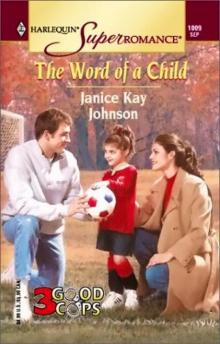 THE WORD OF A CHILD
THE WORD OF A CHILD Harlequin Superromance May 2016 Box Set
Harlequin Superromance May 2016 Box Set Open Secret
Open Secret The New Man
The New Man Finding Her Dad
Finding Her Dad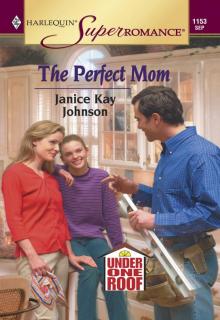 The Perfect Mom
The Perfect Mom All Through The House
All Through The House Match Made in Court
Match Made in Court Making Her Way Home
Making Her Way Home From This Day On
From This Day On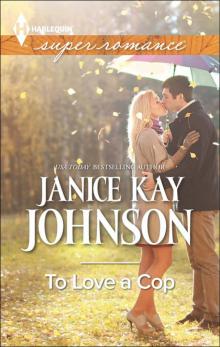 To Love a Cop
To Love a Cop The Hero's Redemption
The Hero's Redemption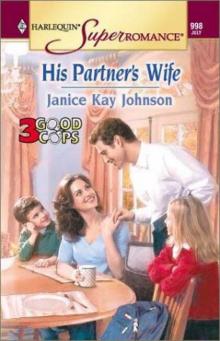 HIS PARTNER'S WIFE
HIS PARTNER'S WIFE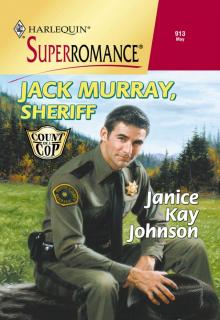 Jack Murray, Sheriff
Jack Murray, Sheriff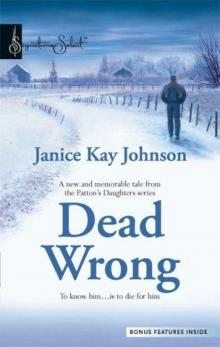 Dead Wrong
Dead Wrong Twisted Threads (A Cape Trouble Novel Book 3)
Twisted Threads (A Cape Trouble Novel Book 3) Bone Deep
Bone Deep The Closer He Gets
The Closer He Gets With Child
With Child Whose Baby?
Whose Baby? Kids by Christmas
Kids by Christmas